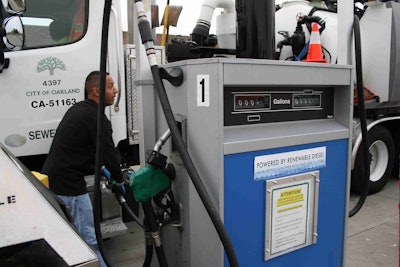 The City of Oakland in California switched from biodiesel to renewable diesel citing more favorable emissions and ease of use.
The City of Oakland in California switched from biodiesel to renewable diesel citing more favorable emissions and ease of use.The Environmental Protection Agency is calling for an increase in renewable fuel requirements for 2017, including renewable diesel, which the agency wants to increase roughly 16 percent in volume over last year while edging up biodiesel by only 5 percent.
The EPA’s final Renewable Fuel Standards (RFS) for 2017 proposes that all renewable fuels, which includes ethanol, biodiesel and renewable diesel, increase from 18.11 to 19.28 billion gallons. That’s nearly a 7 percent increase over 2016 requirements.
Cellulosic biofuels, such as ethanol, got the biggest percentage increase of all renewable fuels. The EPA recommended a 35 percent increase in 2017 from 230 to 311 million gallons.
Biomass-based diesel, or biodiesel, saw the smallest increase of all renewable fuels from 1.9 to 2 billion gallons next year.
However, renewable diesel, an advanced biofuel which is often confused with biodiesel, increased from 3.61 to a 4.28 billion gallons, which is nearly a 16 percent gain.
Neste, the world’s largest producer of renewable diesel, applauded the EPA’s recommendations.
“We appreciate the EPA’s commitment to increasing renewable fuel volume requirements. Determination and bold decisions are required to reduce carbon emissions and meet the ambitious targets set in the Paris Climate agreement,” says Kaisa Hietala, executive vice president of Neste’s Renewable Products business area.
“Neste Renewable Diesel is an ideal low-carbon fuel to meet the US renewable fuel standards, as it is fully compatible with existing diesel engines and fuel distribution systems. Neste is active in the U.S. market and our renewable diesel has been very well received, especially in California.”
Neste Renewable Diesel is being used by U.S. refiners, blenders and fuel distributors to meet their renewable fuel requirements. Additionally, the fuel is being used by U.S. cities such as Oakland, San Diego, Carlsbad and San Francisco as well as corporations such as Google and UPS.
According to the EPA, Congress created the RFS program in an effort to reduce greenhouse gas emissions and expand the nation’s renewable fuels sector while reducing reliance on imported oil.










